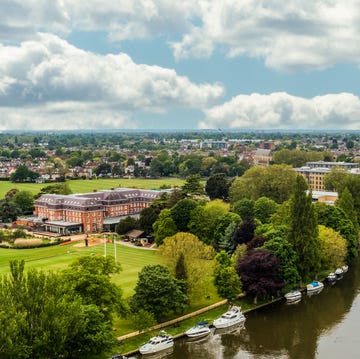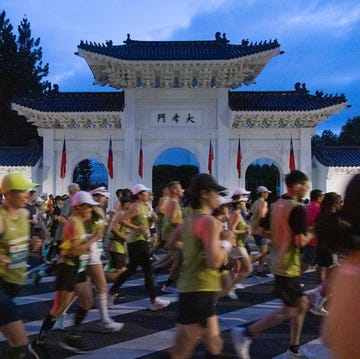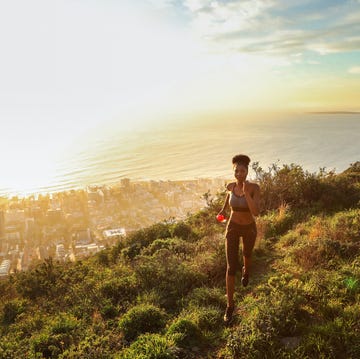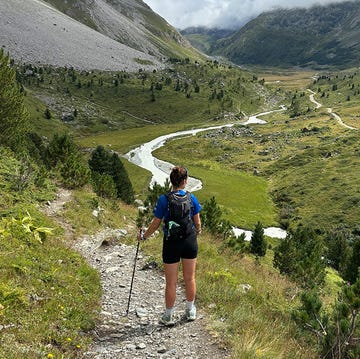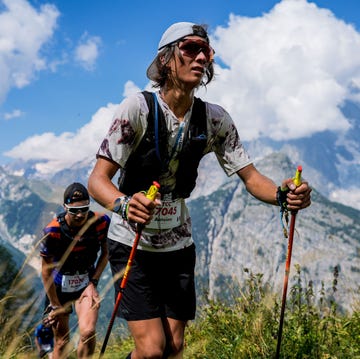It’s pretty hard to beat the feeling of crossing a marathon finish line. If you’ve done it, you’ll know exactly what I’m talking about. It’s that perfect mix of euphoria and exhaustion as months of hard work come to fruition, culminating in one unforgettable moment. In fact, I love that feeling so much that in the past four years I’ve run 11 marathons and two ultramarathons. If that sounds excessive, that’s because it is. Hi, I’m Ali and I’m addicted to the runner’s high.
Of course, there are many benefits of running, but the downside to running marathons (aside from the never-ending washing and the chafing) is that they’re often followed by a dip in mood in the days afterward. I am, of course, talking about the post-marathon blues.
Dr Josephine Perry, Sport Psychologist at Performance in Mind, describes this as the phenomenon that pops up ‘three of four days after the race when the excitement has died down, the legs have started to recover and your brain realises the goal that you have been working towards for so long has gone’.
What everyone's reading
‘Even if the race went brilliantly, the lack of knowing “what’s next” can still make you feel discombobulated and out of sorts,’ she adds.
Like many runners, I’ve been guilty of immediately finishing one race and looking ahead to the next. But it’s important to take the time for reflection, says Perry. That might involve planning ‘fortnight after race’ activities, she suggests, which could include celebratory activities or doing things you’ve missed due to training.
It’s also important to give back, she adds. ‘Marathon training can be intense for you and your loved ones. You have to be fairly selfish to prioritise running and recovery, so the few weeks post-race are a good time to give back to those who supported you.’
Finally, Perry says that it’s important to take some time away from training – and that includes resisting the urge to sign up for another race right away.
‘You need time to both mentally and physically rest and recover,’ she says.
This February, less-than-fresh from an ultramarathon in Gran Canaria and all too familiar with the post-marathon slump, I knew that I was in need of a real reset. The problem is, we’re all guilty of going away for the weekend and coming back more exhausted than we left. Couple that with my tendency to doomscroll instead of actually unwind and, suddenly, a European city break wasn’t promising the blues-banishing benefits I was looking for.
So, instead, my partner and I decided to check ourselves in to a remote countryside cabin for 72 hours. The terms and conditions? No phones, no social media and no technology. I hoped that it would give me the space to reflect, give back to my partner and, as Perry puts it, properly recover – both mentally and physically.
Getting there
Unplugged is the UK’s ‘first digital detox escape’, with over 30 cabins all easily accessible from major cities. The concept is simple: guests lock their phones away for 72 hours – the scientifically proven sweet spot for better sleep, less stress, sharper focus and improved relationships.
My partner and I visited Roland, nestled among several acres of grassy field in the Candover Valley, just outside of Basingstoke. As Southeast Londoners, it was just a short 45-minute train ride from London, followed by a 15-minute taxi to the cabin.
We were dropped at the top of a long track, where we caught the first glimpse of our cabin, perched several metres up a sloping field. A trolley was provided for us to pile our belongings into, and together we tugged it toward our home for the next three days, smiling like two giddy school children.
The moment we stepped inside the cabin, a sense of calm washed over me. Roland is rustic in appearance but I noted expensive furnishings, including Piglet In Bed linen bedding and a Le Creuset kettle. Everything is powered almost entirely by solar energy, which means that it’s equipped with a hot shower, plus a composting toilet, radio cassette player, a shelf full of books and plenty of board games to keep you occupied. There’s also an indoor and outdoor fire to keep you cosy.
On the table, there’s a polaroid camera and the infamous phone lockbox. In go our devices for the next 72-hours – an old school Nokia is provided for emergencies – and the key stowed securely away. Then it’s time for the detox to begin.
Slowing down
Our first night in the cabin happened to be my birthday, so we popped open a bottle of Prosecco and – in the interest of celebrating one’s achievements – raised a glass to the previous week’s ultramarathon as we sat around the fire pit, marvelling at the tranquility of our surroundings. We’d brought some supplies with us, so we made dinner to the soundtrack of Madonna’s Like A Virgin on cassette tape, before falling into those linen bed sheets, surprisingly exhausted, at 11pm.
On Saturday morning, we rose naturally (albeit by 7am, but that’s runners for you) and opened the glass walls surrounding the bed to reveal the sun shining onto the rolling hills. There wasn’t a cloud in the sky. We turned the radio on, made a fresh batch of coffee and laid in bed for another hour, chatting and dozing. This felt like a treat in itself: lie-ins don’t exactly come thick and fast during training blocks, and I could feel my body thanking me for the slower start.
After a leisurely breakfast, we decided to swap the long run for an amble to The Sun Inn, armed with a paper map for directions. It took us a few wrong turns to arrive at our destination, but we didn’t mind – there was something freeing about having no schedule to stick to and we took the time to stop and notice the little details that we’d usually rush past.
Watching the sunset that evening, we reflected on the fact that we’d been without our phones for over 24 hours. Without the constant buzz of notifications, time felt slower – more intentional – and we sat and talked, watching as the sky deepened into night, feeling more connected to the world – and each other – than we had in weeks.
On Sunday, after the same morning ritual as the previous day, we ventured out for an easy 10K to The Yard, a rural cafe set on a working farm, in search of breakfast. Plodding along the country roads, we relished the fresh air hitting our lungs – quite the contrast to the smog of Southbank. We bought dinner supplies from the local village store and let the rest of the day unfold at its own pace: a chapter of a book in the sun and a couple of games of Scrabble. It’s funny how we forget to be bored as adults and how we fill every spare moment with screens, to-do lists and endless activity. Yet here, boredom wasn’t something to resist – it was a luxury. I felt a sense of ease settle in – a reminder that doing nothing is sometimes the most restorative thing of all.
More than a detox
Running a marathon is a strange thing. We spend months training for a race, only to allow ourselves just a few hours to revel in the achievement. The next day, our medal is placed in a drawer with the rest and we’re straight onto Googling our next challenge. By taking the time to reflect on my race, I realised that there’s nothing gratuitous about feeling proud of yourself – nor is there any harm in dragging out those celebrations for a few more days.
And so to the main reason I came on this trip: those post-marathon blues – did I kick them? With resounding certainty: yes. By the time our return train pulled into London, I felt more energised and refreshed than I had in months. The prospect of training again felt exciting, rather than exhausting, and a weight that I wasn’t even aware I was carrying had lifted. The art of recovery, it seemed, was actually to relax.
But beyond the post-race blues, I found unexpected joy in human connection. My partner and I spent countless hours talking about our goals, learning new, unexpected things about each other and having conversations that we might have ordinarily put off. Perry was right – it’s important to give back to your loved ones.
In the end, this trip was more than just a post-marathon reset – it was a lesson in slowing down and truly appreciating what I’d worked so hard for. It reminded me that recovery isn’t just about giving your legs a break – it’s about giving your mind one, too. And while I know I’ll always chase that finish line high, I’ve realised that the real victory isn’t just in the race itself – it’s in giving yourself the time to celebrate it.
Book a stay at Unplugged, starting from £390 for two people for three nights.









